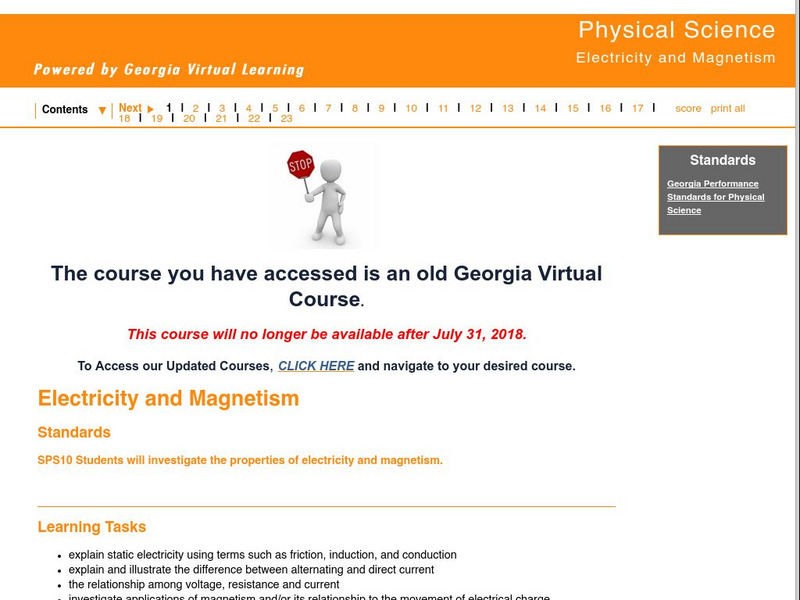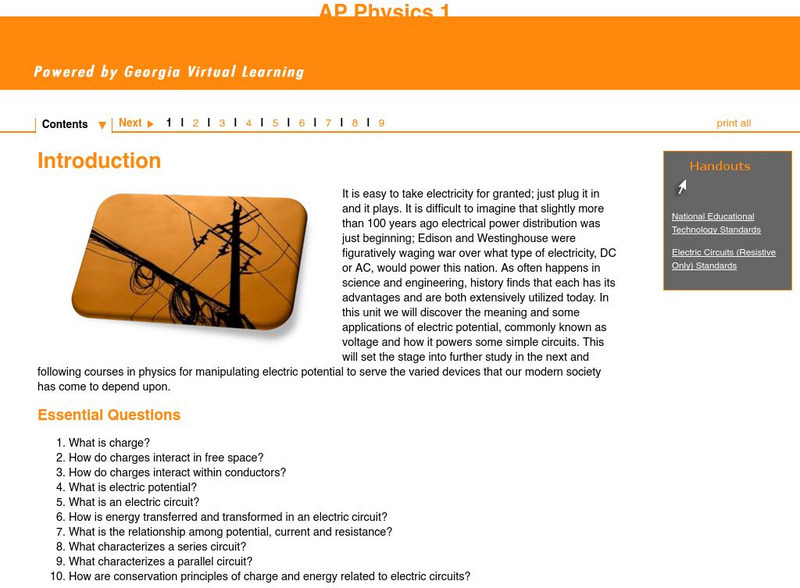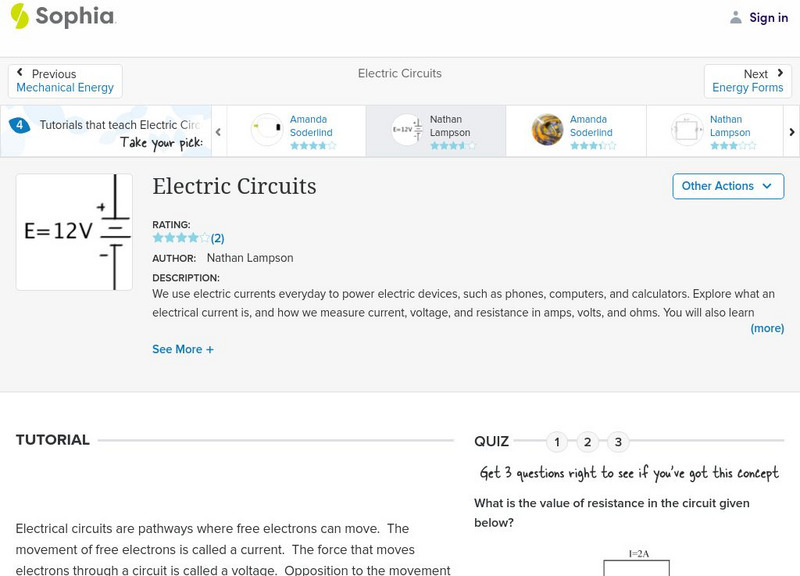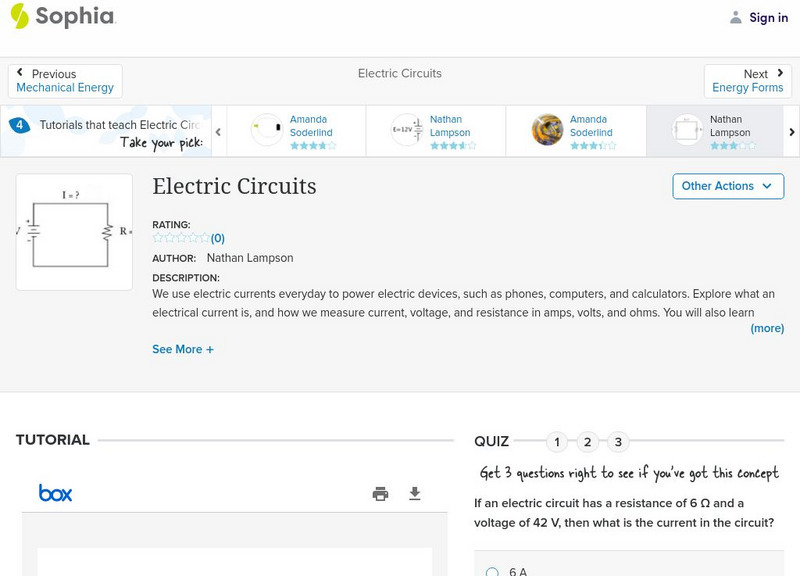Hi, what do you want to do?
Concord Consortium
Concord Consortium: Calculating Voltage in Series Parallel Circuits
Use the series and parallel resistance formulas to determine the total resistances of the parts. Then, use Ohm's Law to calculate the voltage drops across each part.
Other
Easyphysics: Chapter 13 Current Electricity
Learners investigate current electricity. Some topics examined are voltage law, Ohm?s law, and electric resistance. The resource includes example problems with solutions and a chapter quiz.
Concord Consortium
Concord Consortium: Measuring Voltage in Series Parallel Circuits
Measuring voltage drops across resistances in series-parallel circuits requires an understanding of both series and parallel circuit behavior. Learn more with this tutorial.
Concord Consortium
Concord Consortium: Calculating Voltage in Series Circuits
See how Ohm's Law can tell us that the voltage across resistors will depend on that current value I and each R-value.
Concord Consortium
Concord Consortium: Measuring Voltage in Series Circuits
Measuring the voltage in a circuit is like measuring the drop in pressure across two points. Learn more with this tutorial.
Concord Consortium
Concord Consortium: Measuring Voltage on a Breadboard
Find out how measuring voltage in a circuit is like measuring the pressure in a water pipe.
Science and Mathematics Initiative for Learning Enhancement (SMILE)
Smile: Resistances in Series and Parallel Circuits
A teacher lesson plan is provided here. This page describes two activities in which the effect of multiple resistors on the current and overall resistance of both series and parallel circuits are investigated. Complete activity...
Georgia Department of Education
Ga Virtual Learning: Physical Science: Electricity and Magnetism
Students learn about static electricity using terms such as friction, induction, and conduction. They also explain and illustrate the difference between alternating and direct current, and understand the relationship among voltage,...
Georgia Department of Education
Ga Virtual Learning: Ap Physics 1: Electric Circuits
In this unit students discover the meaning and some applications of electric potential, commonly known as voltage, and how it powers some simple circuits.
Khan Academy
Khan Academy: Electric Potential Difference and Ohm's Law Review
Review the key terms, equations, and skills related to Ohm's law, including how electric potential difference, current, and resistance are related.
Georgia State University
Georgia State University: Hyper Physics: Resistor Combinations
At this site from Georgia State University parallel and series connections of resistors are explained and illustrated. Equations for computing the overal voltage, current, and resistance of such circuits are given and explained.
Sophia Learning
Sophia: Electric Circuits: Lesson 2
This lesson will explain how to calculate voltage, current, and resistance in simple electric circuits. It is 2 of 4 in the series titled "Electric Circuits."
Sophia Learning
Sophia: Electric Circuits: Lesson 4
This lesson will explain how to calculate voltage, current, and resistance in simple electric circuits. It is 4 of 4 in the series titled "Electric Circuits."
Ducksters
Ducksters: Physics for Kids: Ohm's Law
Kids learn about Ohm's law in the science of electricity and physics including current, resistance, voltage, example problems, and V=IR.
ClassFlow
Class Flow: Electricity
[Free Registration/Login Required] Students can use this Flipchart to learn and apply Ohm's law to basic circuitry problems. Students are introduced to the relationship among voltage, current, and resistance, and then apply their newly...
Science4Fun
Science4 Fun: Ohm's Law
Brief explanation of Ohm's Law which provides the relationship between current, voltage, and resistance.
Mocomi & Anibrain Digital Technologies
Mocomi: What Is Ohm's Law?
Explains Ohm's Law which is the mathematical relationship between electric current, resistance, and voltage.
CK-12 Foundation
Ck 12: Physics Simulation: Power Lines
[Free Registration/Login Required] Learn about the relationship between electric potential, current, and resistance in the context of high-voltage AC power lines using this interactive simulation. A PDF worksheet and a video tutorial are...
Physics Aviary
Physics Aviary: Simple Circuit Lab
This lab is designed to have students investigate the relationships between voltage, resistance and current in a circuit with only one passive component. The batteries in this simulation can be varied from ideal batteries to batteries...
Physics Aviary
Physics Aviary: Parallel Circuit Lab
This lab is designed to have students investigate the relationships between voltage, resistance and current in a parallel circuit with up to three passive components. The batteries in this simulation can be varied from ideal batteries to...
Oswego City School District
Regents Exam Prep Center: Electricity: The Mouse Cheese Analogy
This page uses a mouse and cheese analogy to show the relationships involved in electricity through currents and charges. Among the topics covered by the analogy are voltage, resistance and electromagnetism.
Physics Aviary
Physics Aviary: Ohm's Law
This lab is designed to have students investigate the relationships between voltage, resistance and current in a circuit with only one passive component. This version of the lab requires students to read analog meters to get the voltage...
Other
Need: Measuring Electricity [Pdf]
This site details many of the ways in which to measure electricity. Among the topics covered by this page is resistance and voltage as well as electrical energy and Ohm's Law.
Science Struck
Science Struck: Lcr Meter Working Principle and Uses
Explains what an LCR meter is and how it is used to measure the inductance, capacitance, and resistance of a circuit. Lists the different parameters of a circuit that it measures, describes two types of LCR meters, and gives definitions...





















